On March 27, President Hassan Rouhani arrived in Moscow with a large political and economic delegation for a two-day visit. Iranian and Russian officials signed 14 memoranda of understanding to cooperate on a range of security, economic, scientific and cultural issues. Putin highlighted that bilateral trade had increased 70 percent compared to last year. Banking officials from both countries discussed creating a joint bank account to facilitate trade in rubles and rials, which could further boost trade.
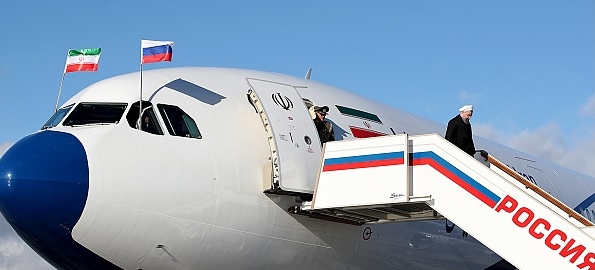 It was Rouhani’s first official visit to Moscow as president and his first foreign trip since the start of the new Persian year (March 20). Previously, President Vladimir Putin had met Rouhani eight times, mainly on the sidelines of international events. Putin met Rouhani in 2015 while in Tehran for the Gas Exporting Countries Forum.
It was Rouhani’s first official visit to Moscow as president and his first foreign trip since the start of the new Persian year (March 20). Previously, President Vladimir Putin had met Rouhani eight times, mainly on the sidelines of international events. Putin met Rouhani in 2015 while in Tehran for the Gas Exporting Countries Forum.
In a joint statement, Rouhani and Putin expressed support for the continued implementation of the Iran nuclear deal. They also seemed to criticize U.S. foreign policy by dismissing “unilateral sanctions” as “illegitimate,” likely a reference to U.S. sanctions on Iran for human rights abuses and support for terror and Russia for its aggressive actions towards Ukraine. They also expressed disapproval of cyberattacks, citing the Stuxnet attack on Iranian nuclear sites, though they did not implicate the United States and Israel in the statement, who are widely assumed to be responsible.
Putin and Rouhani discussed their shared interests in the security and stability of Iraq, Syria, Yemen, Afghanistan, Central Asia, and the Caucasus. The Syrian conflict was also key topic on the agenda. Both countries have provided military support to President Bashar al Assad and are concerned with the concentration of jihadi groups in the war-torn country. Foreign Minister Mohammad Javad Zarif said that Russia could use Iranian military bases to launch airstrikes on militants in Syria on a “case by case basis.” Russia’s use of Iran’s Hamedan airbase in August 2016 marked the first time a major power had conducted military operations from Iranian soil since the 1979 revolution.
At the end of the visit, Rouhani told the press that Iran-Russia relations had reached a new level. “Today we have many major long-term projects, including in energy, and also in oil and gas production, which are already either fulfilled or are at the final stage of talks and close to implementation,” he said. The following is a rundown of the visit.
March 27
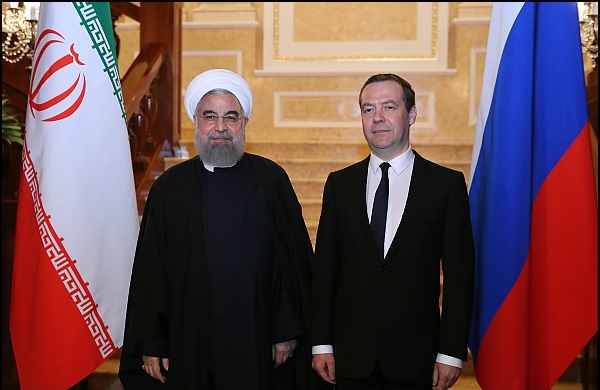
President Rouhani arrived in Moscow and met with Russian Prime Minister Dmitry Medvedev. Both leaders emphasized their governments’ desires to deepen bilateral cooperation. "Without a doubt, the two countries' cooperation in the process of stability and security of the region and the world will have positive effects,” said Rouhani.
March 28
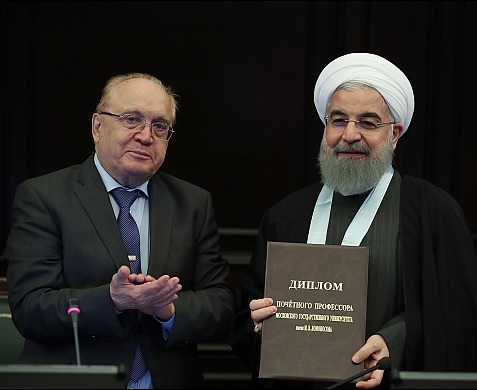
Rouhani received an honorary doctorate from Moscow State University for his efforts to expand academic ties between Iran and Russia. He said that cooperation among academics, scientists and governments is necessary to tackle challenges now facing the world. "The wane of the West's dominance and the end of wealth monopoly is a historic opportunity to build a new world,” he told professors and students.
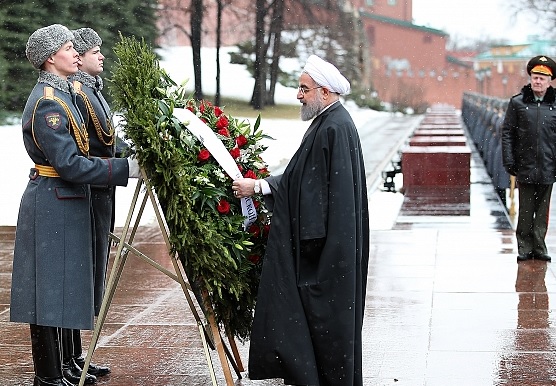
Rouhani then visited the Tomb of the Unknown Soldier memorial to pay his respects to soldiers killed during World War II.
Also on March 28, Foreign Minister Zarif told Reuters the following regarding Russian use of Iranian military bases:
"Russia doesn't have a military base (in Iran), we have good cooperation, and on a case by case basis, when it is necessary for Russians fighting terrorism to use Iranian facilities, we will make a decision.”
Presidents Rouhani and Putin met in the Kremlin. They discussed a wide range of issues and members of their respective delegations signed 14 agreements boosting cooperation in political, economic, scientific, legal, and cultural fields. The two leaders then issued a lengthy joint statement. The following are categorized excerpts:
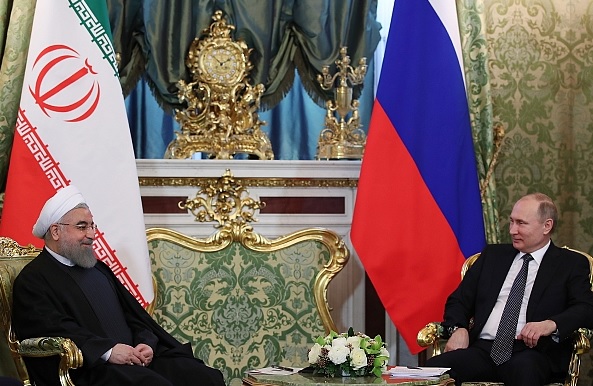 Iraq, Lebanon and Yemen
Iraq, Lebanon and Yemen
“Russia and Iran support preserving Iraq’s territorial integrity, stand for lifting the blockade on Yemen, positively assess the Lebanon political process and express the hope for the fair settlement of the Palestinian problem.”
“Russia and Iran state their support for the sovereignty and territorial integrity of the Republic of Iraq, the efforts taken by the Iraqi authorities aimed at fighting terrorism represented by the Islamic State [a terrorist organization outlawed in Russia] and other extremist groupings, and also at restoring control of the country’s territories seized by such groupings.”
"The sides resolutely denounce the terrorists’ crimes against the Iraqi people, including the crimes aimed against the national and religious minorities and the cultural heritage of Iraq.”
Putin and Rouhani also voiced concern "over the continued destructive war in Yemen" and spoke "for the quickest termination of clashes and the bloodshed," and also stressed "the need to settle this crisis politically as part of a nation-wide dialog."
"Warning about the grave humanitarian and economic consequences of the crisis for the Yemeni people, Russia and Iran stated the need to step up efforts in this direction and, in particular, noted the importance of lifting the economic and humanitarian blockade of Yemen and sending humanitarian aid to that country.”
As for the situation in Lebanon, Putin and Rouhani positively assessed and welcomed cooperation of the country’s political groups in solving the issue of electing the president and forming the government.
"The sides consider the accords reached by them as a good example for solving the remaining Lebanese problems and also for settling internal disagreements in other states of the region.”
"The presidents who expressed the hope for the fair and sustainable settlement of the Palestinian problem stressed the need for the exercise of the national rights of the Palestinian people.”
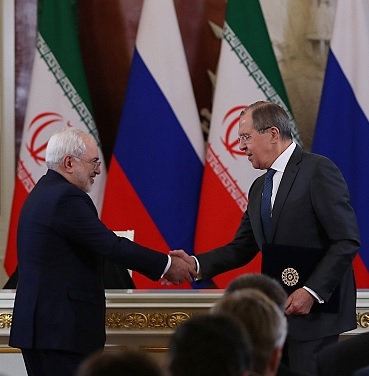
Afghanistan
“Russia and Iran will continue efforts to help Afghanistan strengthen its statehood and call for the implementation of measures to uproot drug production in that and other countries.”
“Putin and Rouhani expressed concern over the deteriorating situation in Afghanistan, over the growth of terrorist threats from extremist forces in that country. Russian and Iran reiterate their commitment to continue assistance to Afghanistan’s efforts to strengthen its state system as a peaceful, democratic, independent and prosperous state.”
The presidents "expressed mutual concern over the growth of drug production in Afghanistan which poses a threat to peace and stability, socio-economic development and security of Afghanistan and other states. The sides pointed to the necessity of the implementation of concrete measures to eliminate global production of drugs, including to uproot illegally sowed narcotic-containing crops and to do away with their processing.”
Energy, Banking and Trade
“Putin and Rouhani hailed agreements of OPEC and non-OPEC countries contributing to demand and offer balancing on the oil market in an acceptable price range and supporting investment attractiveness of the oil sector."
"Russia and Iran will continue cooperating in this sphere for purposes of global energy market stabilization and provision of sustainable economic growth. The parties agree to continue meaningful interaction within the framework of the Gas Exporting Countries Forum aimed at forming a fair balance of interests of gas producers and consumers and at wider application of this efficient and ecofriendly kind of fossil fuel in the global energy balance, particularly for purposes of reducing greenhouse gas emissions."
"Particular attention was paid to expansion of cooperation in the oil and gas sphere, particularly to implementation of joint projects in the territory of Iran in the sphere of exploration, production and transportation of raw hydrocarbons, including to third countries, technology transfers, swaps and construction of related infrastructure," the document said.
"The Russian party informed Iran about completion of domestic government procedures required for entry into force of the agreement between governments of two nations on extension of a state export credit for Iran to finance construction of a thermal power plant and the agreement on provision of a state export credit for Iran to finance electrification of Garmsar-InceBurun railway segment, signed in Tehran on December 13, 2016."
Putin and Rouhani stressed "importance of more active interbank cooperation, including between central banks, and importance of using national currencies in mutual settlements."
"The Russia side confirmed its support to Iran’s application for membership in the Shanghai Cooperation Organization and spoke in favor of the swift consideration of this application.”
Nuclear Deal and Non-Proliferation
"While stating the importance of this Joint Comprehensive Plan of Action [JCPOA] as a multilateral international document, approved by the UN Security Council, Russia and Iran emphasized the need for full compliance by all parties with obligations under this document. At the same time, they stressed the fact that the Islamic republic of Iran has full legitimate rights to the peaceful uses of nuclear energy in accordance with the Non-Proliferation Treaty.”
“Russia welcomed Iran’s strict compliance with its obligations under the Joint Plan, confirmed by the IAEA, as well as its firm intention to strictly observe the agreements within the established deadlines.”
“As for the JCPOA, cooperation between our countries will be continued. Both sides reiterated their course towards the strengthening and implementation of the JCPOA and towards coordination of our cooperation on issues of peaceful use of nuclear energy.”
“In particular, the signing of the contract for pre-project works to alter the two cascades of gas centrifuges in Fordow for the production of stable isotopes and stressed the need for its prompt implementation.”
“Russia and Iran are unanimous that the NPT [Treaty on the Non-Proliferation of Nuclear Weapons] is a corner stone of non-proliferation, of building up nuclear disarmament efforts and of using nuclear power for peaceful purposes.”
"Russia and Iran, supportive of the idea of converting the Middle East into a nuclear-free region, confirmed that the resolution on the Middle East, adopted at the 1995 NPT Review and Extension Conference, will stay in effect until its aims have been achieved.”
International Law and Order
“Moscow and Tehran believe unilateral sanctions against countries to be illegitimate. Imposing unilateral sanctions against countries is illegitimate.”
“By boosting bilateral cooperation, Russia and Iran seek to enhance the central coordinating role of the United Nations in ensuring peace, security and sustainable development, and to further improve its effectiveness.”
Cyberattacks
“Russia and Iran expressed their concern over the steadily rising number of the instances of using information and communication technologies for criminal, terrorist, military and political goals.”
“The sides have denounced the attempts of using force or the threat of force in the information space, such as an attack on Iranian nuclear facilities with the help of the Stuxnet malware, and also any attempts to involve information and communication techniques for harmful purposes.”
The two "pointed to the need to elaborate under the UN aegis the rules of the states’ responsible behavior in the information space and noted the readiness of Russia and Iran to develop cooperation in this direction.”
Visas
"Putin and Rouhani welcome the signing of the Agreement on visa-free group tours that aims at boosting cultural and humanitarian cooperation between Russia and Iran as well as at creating conditions for boosting tourist exchange.”
"The presidents handed down instructions to consider further joint steps to remove administrative barriers hampering trips of certain categories of citizens."
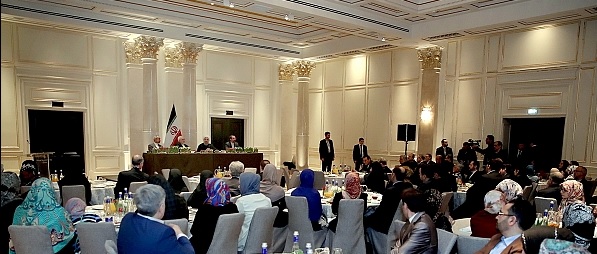
Rouhani also met with Iranian nationals residing in Russia. He highlighted his government’s economic achievements in the previous year. “Single-digit inflation rate, 11.6 percent economic growth, and creating employment are signs of the correct path,” he said. Rouhani also said Russia and Iran are determined to increase their annual trade to $10 billion.
Before leaving Moscow, Rouhani summed up his trip to the press. The following are excerpted remarks.
President Hassan Rouhani
“Relations between Iran and Russia have entered a new stage. Today we have many major long-term projects, including in energy, and also in oil and gas production, which are already either fulfilled or are at the final stage of talks and close to implementation.”
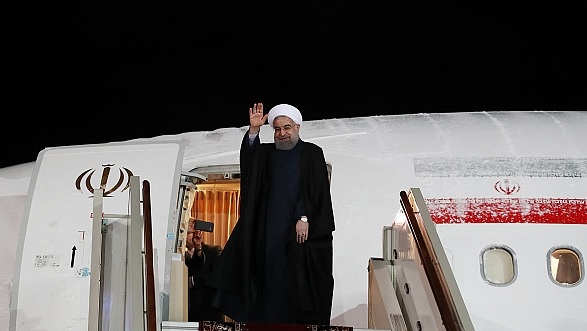 "Russia is a member of P5+1 that has helped Iran a lot in the implementation process of the Joint Comprehensive Plan of Action (JCPOA) and nuclear cooperation, as well as tapping peaceful nuclear technology.”
"Russia is a member of P5+1 that has helped Iran a lot in the implementation process of the Joint Comprehensive Plan of Action (JCPOA) and nuclear cooperation, as well as tapping peaceful nuclear technology.”
"Iran and Russia have had good, constructive cooperation with each other in the field of fighting terrorism and attempting to establish peace and stability in the region, as well as resolving the Iraqi and Syrian issues.”
“Today in our negotiations with Mr Putin, we talked about Syria, Iraq, Yemen, and regional issues, as well as Afghanistan and even the security issues of Central Asia and Caucasus.”
“The issue of transit is very important for us. The two countries are making efforts for connecting the Persian Gulf and Oman Sea to East and North Europe through Iran and the south-north corridor.”
"For resolving the Syrian issue and establishing stability in the region, Iran has tripartite cooperation with Russia and Turkey. We also have close cooperation with Russia and Azerbaijan in transit.”
“Iran and Russia have entered a new phase in their relations. Today, the big projects in the field of oil and gas, with long-term implementation time and considerable investment volume between the two countries are either being implemented or in negotiation phase and ready to be implemented.”
“In the field of railways, new cooperation for electrification, purchasing new locomotives and also carriages will be started. We have agreed to buy 6000 new cargo carriages, out of which 1100 carriages have been purchased already and the others will be built in Iran.”
“Mr Putin has expressed full readiness to sell airplanes and helicopters to us during today's negotiations, stating that Russia is willing to cooperation with Iran in the industry, co-building what is needed in this regard.”
“We also had fruitful negotiations in the field of legal issues regarding the Caspian Sea and the two countries have close views over this issue.”
“The officials of the two countries agreed to let tourists traveling in groups to enter either countries without visas and tourists traveling individually be able to travel easier.”
"In general, we can say that Iran-Russia ties have completely evolved with regard to bilateral and regional issues.”
“We have ample potentials for developing relations between the Islamic Republic of Iran and the Russian Federation and the two governments have good potentials at hand, as well as the required political resolve.”
Click here for background on Iran-Russia relations.
Photo credits: President.ir
